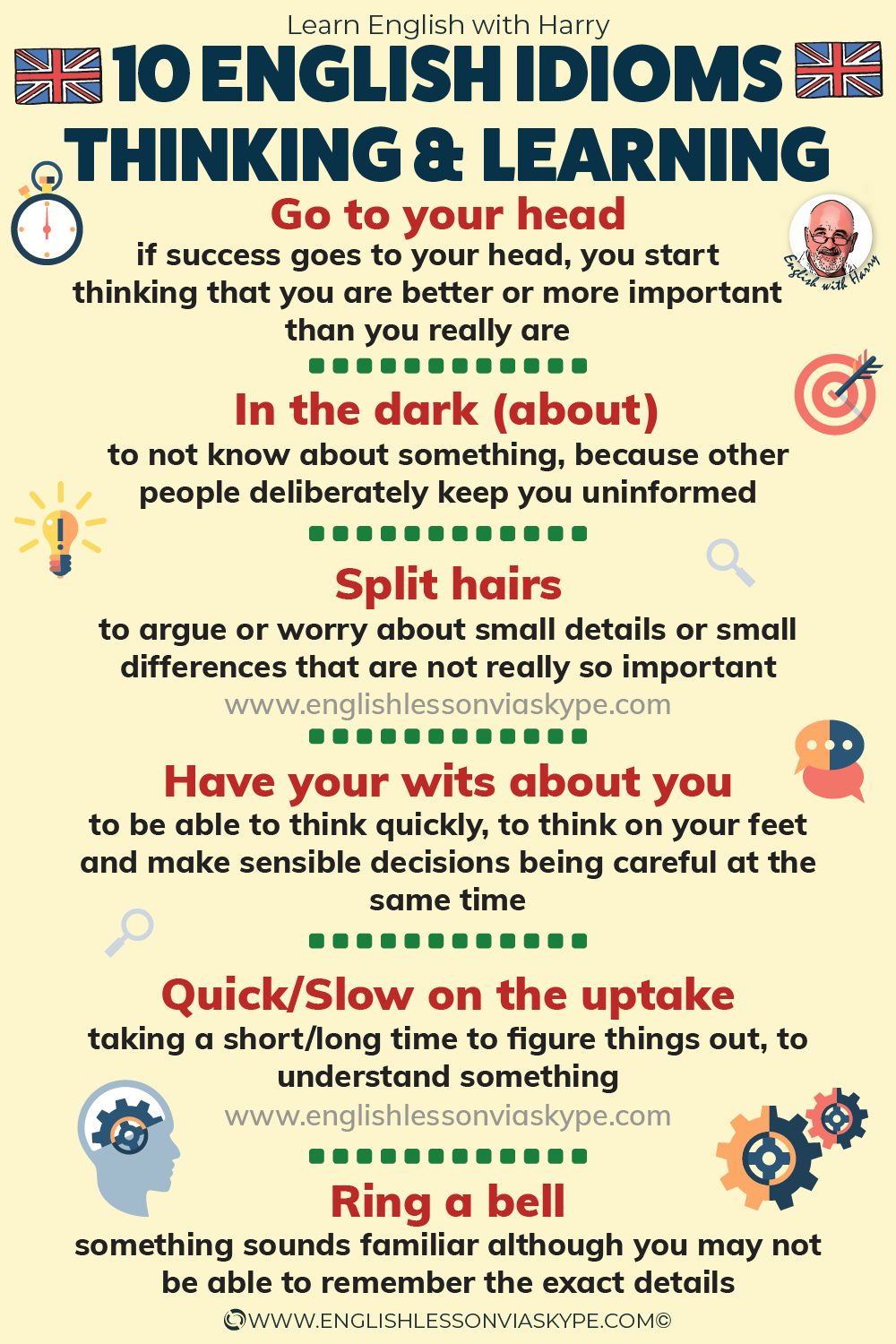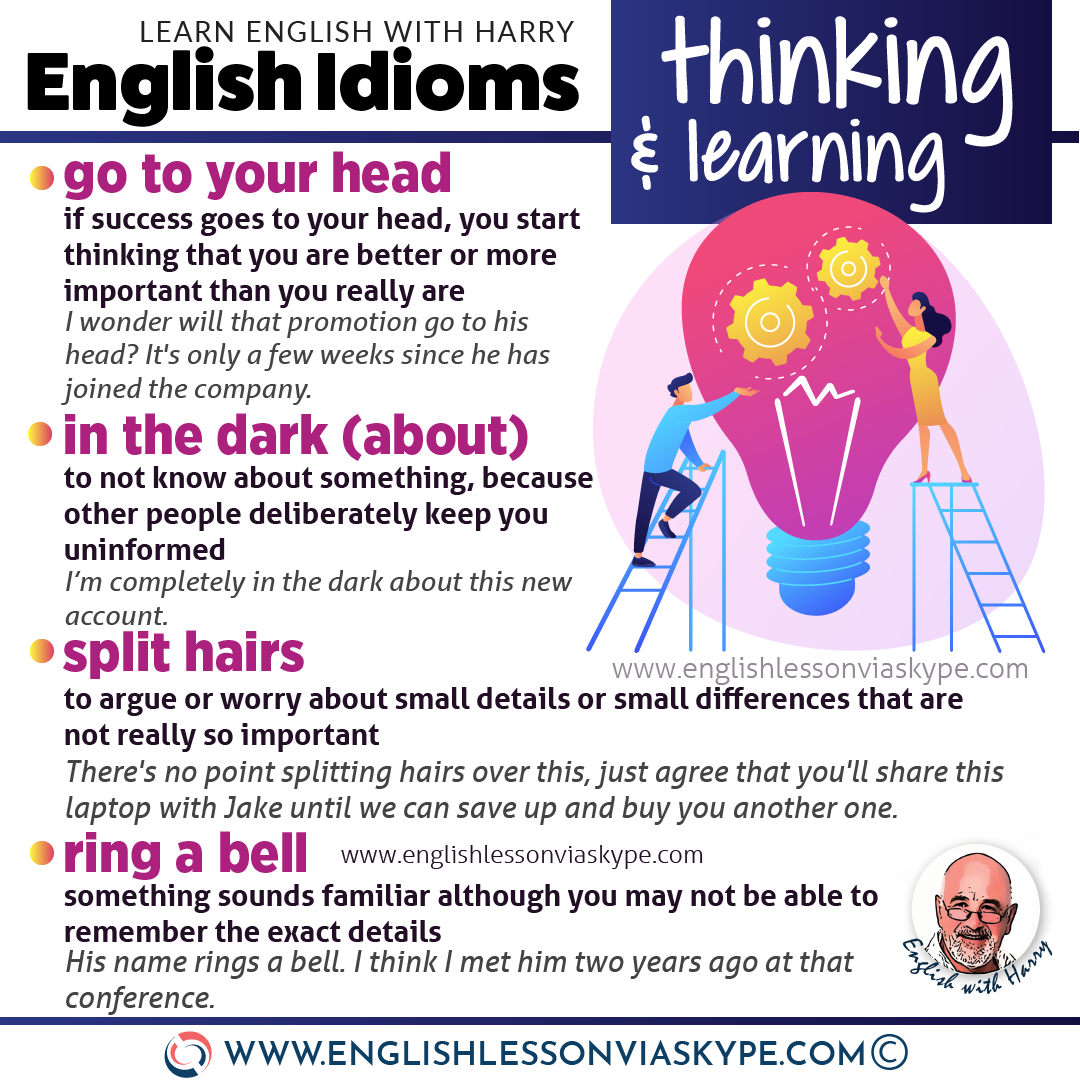Here you will learn 10 English idioms about thinking and learning.
Understand the meanings and start using thinking and learning idioms in your English speaking and writing.
Thinking and Learning Idioms - Podcast Episode 206
list of idioms about thinking
Harry
English idioms about thinking and learning

Hi there, this is Harry and welcome to my English learning podcast Speak Better English with Harry.
Here I try to help you to get a better understanding of the English language so that you can communicate in a better way. We do that by looking at English idioms, phrasal verbs, expressions, collocations, every aspect of English.
Intermediate to Advanced English Marathon

INSANITY: doing the same thing over and over again and expecting different results.
Albert Einstein
- What you'll learn:
- better understanding of more complex grammar structures
- advanced English vocabulary words
- British & American slang
- perfect your listening skills through practing different accents
- This marathon is for you if you're:
- stuck at an intermediate English level
- tired of confusing explanations
- a mature student
- shy & introverted
In this particular episode, we’re going to take a look at some English idioms about thinking and learning. I’ll give you a list of the idioms, then I’ll give you a meaning, and I’ll try to put them into a little example for you.
go to your head
Meaning: when someone thinks that they are better or more important than really are, to become too complacent
We can use it in a positive or a negative way.
Examples:
I know you had an amazing year in sales, but don’t let your success go to your head next year. You have to start all over again.
I wonder will that promotion go to his head? Would he start thinking that he is above all of us? It’s only a few weeks since he has joined the company.
have your wits about you
Meaning: to be able to think quickly, to think on your feet and make sensible decisions being careful at the same time, to be alert
Examples:
When you go into that important meeting, just have your wits about you. Listen carefully to what they’re saying because it can be tricky.
She kept her wits about her and was able to tell the police who attacked her.
English idioms about thinking and learning

Share and help other students to improve English language skills.
in the dark (about)
Meaning: to not know very much about something because other people keep it secret, or don’t share information with you
Example:
I’m completely in the dark about this new account. I’ve been away on holidays for a couple of weeks and I wasn’t included in emails.
In the early days, scientists were completely in the dark as to exactly how this new drug was working.
not to have a leg to stand on
Meaning: to be left in an uneasy or vulnerable position, to not be able to prove that you’re right about something
Example:
We just have to accept what they say because we don’t have a leg to stand on. We didn’t keep any copies of the emails.
not see the wood for the trees
Meaning: to not be able to understand what is really in a particular situation because you’re thinking too much about small details
Examples:
We had important things, housing and healthcare crisis, but the politicians couldn’t see the wood for the trees.
Hold on, hold on, you can’t see the wood for the trees. The answer is there in front of you, this is what we agreed with the customer.
In American English, they say not see the forest for the trees.
English idioms about thinking and learning
put two and two together
Meaning: to guess what is happening or what something means based on the information or facts that you have seen or heard
Example:
After looking at all the old photos, I’ve just put two and two together and realised that I know her sister!
quick or slow on the uptake
Meaning: taking a short/long time to figure things out, to understand something
Examples:
This guy, he’s so slow on the uptake. I must have explained that to him four times and he still comes back and asks me again how it works.
I’ve just told him once, and now he’s running the programme perfectly. He’s very quick on the uptake.
ring a bell
Meaning: something sounds familiar although you may not be able to remember the exact details
Examples:
His name rings a bell…I’m sure I’ve come across this name before. I think I met him two years ago at that conference.
It definitely rings a bell with me, though I don’t know either an artist or a song title.
book your trial English Lesson
English idioms about thinking and learning
split hairs
Meaning: to argue or worry about small details or small differences that are not really so important
Example:
There’s no point splitting hairs over this, just agree that you’ll share this laptop with Jake until we can save up and buy you another one.
round the bend
Meaning: crazy, insane
Example:
Wearing a watch over a sleeve cuff looks a bit round the bend to me.
The third question drove him round the bend, he really couldn’t puzzle it out and had to move on.
So there are my 10 English idioms about thinking and learning. Let’s go through them one more time:
- go to your head
- have your wits about you
- be in the dark
- not to have a leg to stand on
- not see the woods/forest for the trees
- put two and two together
- quick or slow on the uptake
- ring a bell
- split hairs
- round the bend
As always if you want to contact me then you can do so on www.englishlessonviaskype.com. I’m always happy to hear from you and happy for you to give me some suggestions that I can include in my future podcast episodes.
Thanks for listening. Join me again soon.
More information
For more information on English grammar rules, English collocations and English idioms, check out the links below:
10 Ways to say IMPORTANT in English
Idioms related to feelings and emotions
Don’t forget about Learning English with the BBC.
You will love these English lessons

16 Better Ways to Say Angry or Annoyed in English
Learn 16 better ways to say angry or annoyed in English · Furious · Fit to be tied · Hot under the collar meaning · Video lesson


English Vocabulary for Halloween
Autumn is here (where I am living certainly) and is commonly seen as the stepping stone (route, how to get


English Idioms about Memory and Mind
Here you will learn 12 English idioms about Memory and Mind. Lose the plot, to be miles away, a gut